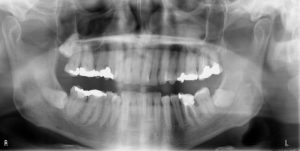Dentist Costs and Other Kid Dentist FAQs
Still have questions? Give us a call!
Whether it’s dentist costs, treatment questions, or other dental related concerns, we have many answers on our page below. If you have other concerns, please do not hesitate to call our office for additional help, you can book an appointment with us here. We are happy to assist you!
What causes tooth decay?
Four things are necessary for cavities to form — a tooth, bacteria, sugars or other carbohydrates and time. When particular bacteria are fed a lot of sweets from our food, they make acids that break down tooth enamel and dentine, causing dental caries, often known as tooth decay. When you eat, the sugars in your food cause the bacteria in plaque to produce acids that attack the tooth enamel. With time and repeated acid attacks, the enamel breaks down and a cavity forms.1
1 Wilson, M., & Wilson, P. J. K. (2021). Tooth decay. In Springer eBooks (pp. 273–291). https://doi.org/10.1007/978-3-030-56978-5_20
How should I clean my baby's teeth?
A toothbrush with soft bristles and a small head, especially one designed for infants, is the best choice for infants. Brushing at least once a day, at bedtime, will remove plaque bacteria that can lead to decay.
Can I stay with my child?
We invite you to stay with your child during their initial examination. After the first dental appointment, we recommend you allow our pediatric dentist staff to accompany your child through their dental experience. This will enable us to establish a close rapport with your child, gain their trust, build their confidence in us and help them overcome apprehension. Our goal is to help children develop independence and to enhance communication with the pediatric dentist and Great Smiles staff.
Why should my child see a pediatric dentist instead of our regular family dentist?
What is baby bottle tooth decay and how can I prevent it?
Baby bottle tooth decay is a pattern of rapid decay associated with prolonged nursing. It happens when a child goes to sleep while breast-feeding and/or bottle-feeding. During sleep, the flow of saliva is reduced and the natural self-cleansing action of the mouth is diminished. Avoid nursing children to sleep or putting anything other than water in their bedtime bottle. Encourage your child to drink from a cup as they approach their first birthday. He/she should be weaned from the bottle at 12-14 months of age.
Can thumbsucking be harmful for my child's teeth?
Thumb and pacifier sucking habits that go on for a long period of time can create crowded, crooked teeth or bite problems. If they are still sucking their thumbs or fingers when the permanent teeth arrive, a mouth appliance may be recommended by your pediatric dentist. Most children stop these habits on their own.
What are dental sealants and how do they work?
Sealants are clear or shaded tooth colored resin applied to the teeth to help keep them cavity-free. Sealants fill in the grooved and pitted surfaces of the teeth, which are hard to clean, and shut out food particles that could get caught, causing cavities. Fast and comfortable to apply, sealants can effectively protect teeth for many years.
When should my child start using toothpaste?
Parents should use a tiny smear of fluoride toothpaste to brush baby teeth twice daily as soon as they erupt. Once children are 3 to 6 years old, then the amount should be increased to a pea-size. Children should spit out and not swallow excess toothpaste after brushing.
If my child gets a toothache, what should I do?
To comfort your child, rinse his/her mouth with warm salt water and apply a cold compress or ice wrapped in a cloth to your child’s face if it is swollen. Do not put heat or aspirin on the sore area, but you may give the child acetaminophen for pain. See one of our pediatric dentists as soon as possible.
What are the 5 steps to brushing your teeth
Gear Up: Grab a soft-bristled toothbrush and a pea-sized amount of fluoride toothpaste.
Brush All Sides: Tilt your brush at an angle and gently brush the front, back, and top of each tooth using small circles or back-and-forth motions.
Don’t Forget the Insides: Brush the inner surfaces of your teeth too!
Tongue Time: Give your tongue a brush to remove bacteria and freshen breath.
Brush for Long Enough: Aim for at least 2 minutes of brushing to thoroughly clean your teeth.
Is my child getting enough fluoride?
Fluoride has been shown to dramatically decrease a person’s chances of getting cavities by making teeth stronger. If your child is not getting enough fluoride internally through water (especially in communities where the water district does not fluoridate the water or if your child drinks bottled water without fluoride), your pediatric dentist may prescribe fluoride supplements. Flouride can help prevent future dentists costs by protecting teeth.
How safe are dental x-rays?
With contemporary safeguards, such as lead aprons and high-speed film, the amount of radiation received in a dental x-ray examination is extremely small. Even though there is very little risk, pediatric dentists are particularly careful to minimize the exposure of child patients to radiation. In fact, dental x-rays represent a far smaller risk than an undetected and untreated dental problem.

My child plays sports. How should I protect my child's teeth?
A mouth guard should be a top priority on your child’s list of sports equipment. Athletic mouth protectors, or mouth guards, are made of soft plastic and fit comfortably to the shape of the upper teeth. They protect a child’s teeth, lips, cheeks and gums from sports-related injuries. Any mouth guard works better than no mouth guard, but a custom-fitted mouth guard fitted by one of our pediatric dentists is your child’s best protection against sports-related injuries.
When do the first teeth start to erupt?
At about 6 months, the two lower front teeth (central incisors) will erupt, followed shortly by the two upper central incisors. The remainder of the baby teeth appear during the next 18 to 24 months but not necessarily in an orderly sequence from front to back. At 2 to 3 years, all of these 20 primary teeth should be present.
What should I do if my child knocks out a permanent tooth?
First of all, remain calm. If possible, find the tooth and hold it by the crown rather than the root. Replace the tooth in the socket and hold it there with clean gauze or a washcloth. If you can’t put the tooth back in the socket, place the tooth in a clean container with milk and take your child and the container immediately to one of our pediatric dentists. The faster you act, the better your chances of saving the tooth. Our office offers 24-hour emergency call service during the week and on the weekends.
How can I help my child through the teething stage?
Sore gums when teeth erupt are part of the normal eruption process. The discomfort is eased for some children by use of a teething biscuit, a piece of toast or a frozen teething ring. Your pharmacy should also have medications that can be rubbed on the gums to reduce the discomfort.
I noticed a space between my child's two upper front teeth. Is this cause for concern?
Usually, the space will close in the next few years as the other front teeth erupt. During your child’s next visit, we can determine whether there is cause for concern.
If my child gets a cavity in a baby tooth, should it still be filled?
Primary, or ‘baby,’ teeth are important for many reasons. Not only do they help children speak clearly and chew naturally, they also aid in forming a path that permanent teeth can follow when they are ready to erupt. Some of them are necessary until a child is 12 years old or longer. Pain, infection of the gums and jaws, impairment of general health and premature loss of teeth are just a few of the problems that can happen when baby teeth are neglected. Also, because tooth decay is essentially a progressive bacterial infection, decay on baby teeth can cause decay on permanent teeth. Proper care of baby teeth is instrumental in enhancing the health of your child.
What is the difference between a dentist and a pediatric dentist?
Imagine dentists like doctors. There are general doctors who can see everyone, and then there are special doctors for kids, like pediatricians. That’s what a pediatric dentist is like! They have extra training to care for children’s teeth.
What is the role of a pediatric dentist?
Pediatric dentists are like kid-tooth experts! They take care of children’s teeth from when they’re babies all the way to teenagers. They know just what to do to keep your child’s smile healthy throughout their whole childhood.
What Can You Expect for Dentist Costs?
Visiting the dentist is essential for a healthy smile, but many people wonder, “How much does a dentist cost?” The truth is, dental costs vary depending on the treatment you need, your location, and your insurance coverage.
Factors like materials used, expertise of dentist, and technology impact costs. Specialty treatments (like orthodontics or implants) may cost more.
Does Insurance Cover My Costs
Insurance varies so widely and so significantly, that it really depends on the practice and the specific plan you have. Great Smiles is happy to submit a breakdown of your dental costs to your insurance provider. Like many pediatric dentist and orthodontic practices, Great Smiles does require families to privately pay up front for their services. If insurance is going to reimburse a family, insurance will directly pay back to our families.


